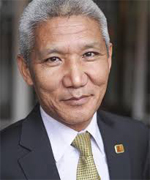Translating: What and How?
On the second day of the conference, the nuts and bolts of the craft of translation became the focus and the main questions asked in this session were: What tools are in your translation workshop? What skills should one cultivate to be a good translator? How do we cultivate those skills? Elizabeth Napper begins the session by looking at the perennial issue of literal vs. aesthetic translation from a practical standpoint of needing to adjust to the intended audience of the translation. Thupten Jinpa continues this discussion of the tension between fidelity to the text and consideration of the reader and begins by making note of the paradoxical nature of translator and translation and highlights the need to have competency in the target language. Kurtis Schaeffer uses humor and intelligence to bring up core issues for translators, all the while presenting a four-fold rubric for analyzing Tibetan poetry: form (lus), content (srog), figure (rgyan), and feeling (nyams). Janet Gyatso discusses her idea of ‘referential resonance’ and the ability to let the text speak to you, the place from which translators make key decisions about how to translate, and the importance of quieting oneself and learning to pay attention to the relationship with a Tibetan teacher trained in a text when reading and translating.
Event: TT Conference 2017 – Plenary Session
Date: June 2, 2017 – 11:00 am
Speakers: Elizabeth Napper, Janet Gyatso, Kurtis Schaeffer, Thupten Jinpa
Topics: Poetry, Translation, Translation Theory

Elizabeth Napper
UMA Institute of Tibetan Studies
Elizabeth Napper began studying Tibetan in 1970. She studied in Wisconsin, Tibet, India (Sanskrit University), and at the Tibetan Buddhist Learning Center, the University of Virginia, where she received a PhD in 1985. She is the director of the Tibetan Nuns Project in India and the USA. She has translated lo rig (Mind in Tibetan Buddhism, Snow Lion, 1980) and major portions of Tsong kha pa’s lam rim chen mo, which was published as the Great Treatise on the Stages of the Path to Enlightenment, (3 volumes, Snow Lion, 2000, 2002, 2004). At present she is working on sa lam, a long chen nying tik ngon dro text, and Sakya practice texts.

Thupten Jinpa
Institute of Tibetan Classics
Thupten Jinpa, PhD, received his early education as a monk and obtained the Geshe Lharam degree from Ganden Monastic University in South India. He holds a BA in philosophy and a PhD in religious studies, both from Cambridge University. Jinpa is an adjunct professor at McGill University. He is associated with the Center for Compassion and Altruism Research and Education at Stanford University, and is the main author of its Compassion Cultivation Training program. He is the board chair of the Mind and Life Institute, the founder and president of the Institute of Tibetan Classics, and the general editor for The Library of Tibetan Classics. Since 1985 he has been the principal English translator to H.H. the Dalai Lama. Jinpa’s published works include translations of numerous books by the Dalai Lama, Songs of Spiritual Experience, Mind Training:The Great Collection, and The Book of Kadam. Most recently he co-translated Grains of Gold by Gendun Chöpel. His books include a first ever introduction to Buddhism in vernacular Tibetan and a comprehensive modern Tibetan grammar (in Tibetan), as well as A Fearless Heart: How the Courage to be Compassionate Can Transform our Lives, and (with Donald S. Lopez Jr.) Dispelling the Darkness: A Jesuit’s Quest for the Soul of Tibet.

Janet Gyatso
Harvard University
Janet Gyatso (BA, MA, PhD, University of California at Berkeley) is a specialist in Buddhist studies with concentration on Tibetan and South Asian cultural and intellectual history. Her books include Apparitions of the Self: The Secret Autobiographies of a Tibetan Visionary; In the Mirror of Memory: Reflections on Mindfulness and Remembrance in Indian and Tibetan Buddhism; and Women of Tibet. She has recently completed a new book, Being Human in a Buddhist World: An Intellectual History of Medicine in Early Modern Tibet, which focuses upon alternative early modernities and the conjunctions and disjunctures between religious and scientific epistemologies in Tibetan medicine in the sixteenth–eighteenth centuries.

Kurtis Schaeffer
University of Virginia
Kurtis R. Schaeffer received an MA in Buddhist Studies from the University of Washington in 1995, a PhD in Tibetan and South Asian Religions from Harvard in 2000 and is now an associate professor of Tibetan and Buddhist Studies at the University of Virginia. His books include Sources of Tibetan Tradition (2013), The Tibetan History Reader (2013), The Culture of the Book in Tibet (2009), An Early Tibetan Catalogue of Buddhist Literature (2009), Dreaming the Great Brahmin (2005), and Himalayan Hermitess (2004).
